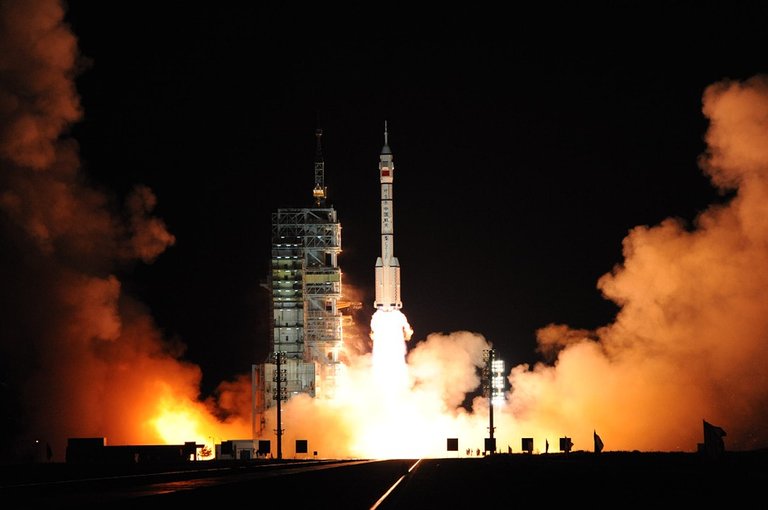Importance of Science and Technology for Society | History of Development | ENG-ESP |
The society has been immersed in different technological changes, as a result of the constant need to improve and simplify the production processes, of the saving and the scarcity of resources and, possibly, the search for greater efficiency and effectiveness, as well as the rational use.
Spanish
La sociedad se ha visto inmersa en diferentes cambios tecnológicos, fruto de la constante necesidad de mejorar y simplificar los procesos de producción, del ahorro y la escasez de recursos y, posiblemente, de la búsqueda de una mayor eficiencia y eficacia, así como del uso racional de los mismos.


From the first industrial revolution that began in 1760 to 1830, where raw materials played an important role, as they helped to build ships and the textile industry; the use of coal as the main source of energy within steam engines and other machines, which reduced the workforce within the factories; boosting mass production at lower cost. This stage took place mainly in England, spreading to Europe and later to the United States and Japan.
Before the Second Industrial Revolution, which originated in 1870-1914, raw materials and oil products were the basis of industrial and social consumption. Another aspect to be mentioned is the use of chemicals in industrial processes to produce final products, both mineral and electrical, as well as the increasing use of oil, water power, new ways of producing cars, the invention of the telephone and the cinema, technological advances in medicine and agriculture were some of the great advances that changed the way society lived in those years.
The next industrial revolution is a truly controversial issue, for some theorists it originated in 1945 and ended in 1962 with the invention of the Internet, although for others it is still in the process of this stage. However, during this period great advances were made in research with the aim of making raw materials cheaper, the use of materials such as steel, copper, glass-ceramics, fibre optics and the incorporation of new energy generation processes such as natural, atomic, wind, solar and hydraulic energy, among others.

Desde la primera revolución industrial que se inició en 1760 hasta 1830, donde las materias primas jugaron un papel importante, ya que ayudaron a construir barcos y la industria textil; el uso del carbón como principal fuente de energía dentro de las máquinas de vapor y otras máquinas, que hizo disminuir la mano de obra dentro de las fábricas; el impulso a la producción en masa a un menor costo. Esta etapa tuvo lugar principalmente en Inglaterra, extendiéndose a Europa y posteriormente a Estados Unidos y Japón.
Antes de la Segunda Revolución Industrial, que se originó en 1870-1914, las materias primas y los productos del petróleo constituían la base del consumo industrial y social. Otro aspecto que hay que mencionar es el uso de productos químicos en los procesos industriales para producir productos finales, tanto minerales como eléctricos, así como el creciente uso del petróleo, la energía hidráulica, las nuevas formas de producir automóviles, la invención del teléfono y el cine, los avances tecnológicos en la medicina y la agricultura fueron algunos de los grandes avances que cambiaron la forma en que la sociedad vivía en esos años.
La próxima revolución industrial es un tema verdaderamente controvertido, para algunos teóricos se originó en 1945 y terminó en 1962 con la invención de Internet, aunque para otros todavía está en proceso de esta etapa. Sin embargo, durante este período se produjeron grandes avances en la investigación con el objetivo de abaratar las materias primas, el uso de materiales como el acero, el cobre, la vitrocerámica, la fibra óptica y la incorporación de nuevos procesos de generación de energía como la natural, la atómica, la eólica, la solar y la hidráulica, entre otras.


On the other hand, the increasing mechanisation of industry, the diversification of capital in industrial sectors, the expansion of telecommunications, advances in medicine and health sciences, the consolidation of multinational companies and the production of products in different countries have transformed the industry, making the phenomenon of globalisation more evident.
Finally, the fourth industrial revolution for many, which began at the end of the 20th century, is still ongoing and developing. In this period, very significant advances have been made for humanity, for example: the Internet, fibre optic connections, the elimination of communication barriers between people in other countries, states, municipalities, as well as a new economic revolution in which physical elements become virtual.
The manufacturing processes are intelligent and robotic, where the human being is not even involved in the production process, the emergence of new sources of work, areas of study such as nanotechnology, biotechnology, robotics, renewable energy, computer science, robotics, 3D designs, quantum processes. The strengthening of the aerospace industry, web applications, the development of smart phones, the strengthening of the pharmaceutical industry and different areas of medicine, the development of the arms industry, virtual connections and social networks, unmanned and renewable fuel vehicles, recycling of raw materials, advances in genetics, the digital genome, are some of the many advances that have been made and that focus, at least theoretically, on sustainability and care for the environment.
Por otro lado, la creciente mecanización de la industria, la diversificación de los capitales en los sectores industriales, la expansión de las telecomunicaciones, los avances en la medicina y las ciencias de la salud, la consolidación de las empresas multinacionales y la producción de productos en diferentes países, han transformado la industria, haciendo más evidente el fenómeno de la globalización.
Por último, la cuarta revolución industrial para muchos, que comenzó a finales del siglo XX, sigue en curso y en desarrollo. En este período, se han logrado avances muy significativos para la humanidad, por ejemplo: Internet, las conexiones de fibra óptica, la eliminación de las barreras de comunicación entre las personas de otros países, estados, municipios, así como una nueva revolución económica en la que los elementos físicos se convierten en virtuales.
Los procesos de fabricación son inteligentes y robotizados, donde el ser humano ni siquiera interviene en el proceso de producción, la aparición de nuevas fuentes de trabajo, áreas de estudio como la nanotecnología, la biotecnología, la robótica, las energías renovables, la informática, la robótica, los diseños 3D, los procesos cuánticos. El fortalecimiento de la industria aeroespacial, las aplicaciones web, el desarrollo de los teléfonos inteligentes, el fortalecimiento de la industria farmacéutica y de diferentes áreas de la medicina, el desarrollo de la industria armamentista, las conexiones virtuales y las redes sociales, los vehículos no tripulados y los que se abastecen de combustible renovable, el reciclaje de materias primas, los avances en la genética, el genoma digital, son algunos de los muchos avances que se han realizado y que se centran, al menos teóricamente, en la sostenibilidad y el cuidado del medio ambiente.


However, much remains to be done, new needs are emerging and others are becoming elements and instruments to facilitate daily activities. It is therefore important to note that scientific and technological progress has been financed mainly by public and private funds, with universities, entrepreneurs, industry, non-governmental organisations, civil society organisations, inventors, etc., What would happen if economic resources were no longer allocated to science and technology? Or how much progress would be made in science and technology by increasing the economic resources allocated to these areas?
Sin embargo, todavía queda mucho por hacer, están surgiendo nuevas necesidades y otras se están convirtiendo en elementos e instrumentos para facilitar las actividades cotidianas. Por lo tanto, es importante señalar que el progreso científico y tecnológico se ha financiado principalmente con fondos públicos y privados, con universidades, empresarios, industria, organizaciones no gubernamentales, organizaciones de la sociedad civil, inventores, etc., lo que permite a la sociedad actual beneficiarse de todas estas ventajas. ¿Qué sucedería si los recursos económicos dejaran de asignarse a la ciencia y la tecnología? ¿O cuánto se progresará en la ciencia y la tecnología aumentando los recursos económicos asignados a estas áreas?.


 | Article to StemSocial Community
| Article to StemSocial Community
 | Article to StemSocial Community
| Article to StemSocial CommunityTraducción realizada con DeeL.
Sources of Pixabay: jarmoluk | bingzhenzhen | blickpixel
Fuentes de Pixabay: jarmoluk | bingzhenzhen | blickpixel
 CLICK HERE TO SUBSCRIBE TO NATURAL MEDICINE COMMUNITY
CLICK HERE TO SUBSCRIBE TO NATURAL MEDICINE COMMUNITYHave you been meaning to try a plant powered life for some time? Are you just a little bit full of Christmas turkey? Are you feeling the sadness of the environmental disaster that is the meat industry? Or maybe you want to just be a little bit healthy?
Why don't you join us for Veganuary?Join the Vevolution: Go Vegan for January! (And Win 100 HIVE!)
@ecoTrain

CLICK HERE TO SUBSCRIBE TO THE ECOTRAIN COMMUNITY
Why don't you join us for Veganuary?Join the Vevolution: Go Vegan for January! (And Win 100 HIVE!)

CLICK HERE TO SUBSCRIBE TO THE ECOTRAIN COMMUNITY
¡Felicitaciones!
Estás participando para optar a la mención especial que se efectuará el domingo 10 de enero del 2021 a las 8:00 pm (hora de Venezuela), gracias a la cual el autor del artículo seleccionado recibirá la cantidad de 1 HIVE transferida a su cuenta.
¡También has recibido 1 ENTROKEN! El token del PROYECTO ENTROPÍA impulsado por la plataforma Steem-Engine.
1. Invierte en el PROYECTO ENTROPÍA y recibe ganancias semanalmente. Entra aquí para más información.
2. Contáctanos en Discord: https://discord.gg/hkCjFeb
3. Suscríbete a nuestra COMUNIDAD y apoya al trail de @Entropia y así podrás ganar recompensas de curación de forma automática. Entra aquí para más información sobre nuestro trail.
4. Creación de cuentas nuevas de Hive aquí.
5. Visita nuestro canal de Youtube.
Atentamente
El equipo de curación del PROYECTO ENTROPÍA
Muchas gracias entropia!